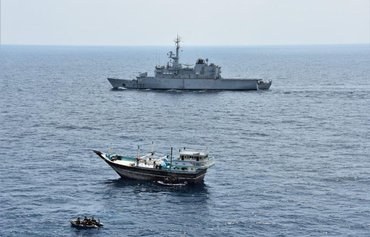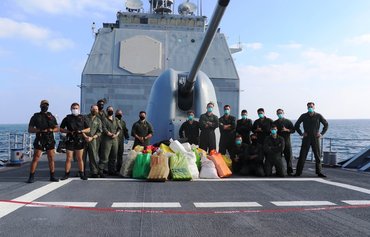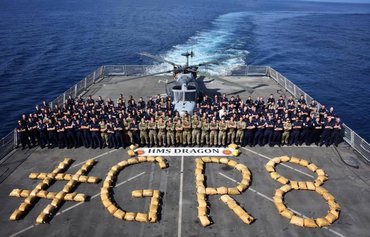The efforts of Combined Maritime Forces (CMF) to combat drug smuggling on the Arabian Sea are key to countering terror financing, experts told Al-Mashareq.
Combined Maritime Forces on February 1st intercepted a vessel being used to smuggle almost half a tonne of heroin across the Western Indian Ocean.
Naval officers aboard CMF warships seized 414 kilogrammes of heroin worth more than $124 million from the vessel, and disposed of the drugs at sea.
The CMF is a multinational naval partnership, which exists to promote security, stability and prosperity across approximately 3.2 million square miles of international waters and some of the world’s most important shipping lanes.
The main focus of the 32-nation force is defeating terrorism, preventing piracy, encouraging regional co-operation, and promoting a safe maritime environment.
Since November, combined forces have seized and destroyed 11.5 tonnes of hashish and 1.5 tonnes of heroin worth more than $1 billion from seven vessels.
"Having significant success seizing almost 12 tonnes of narcotics, CMF warships are eager to return to the waters of the Northern Arabian Sea, so they can continue their role in fighting the illicit smuggling that supports terrorism," a CMF official said.
"The sailors and marines of CMF are keen to return to the site of previous successes," another CMF official said. "The CMF warships look forward to adding to the total of over 12 tonnes of narcotics seized recently."
Thwarting smugging attempts
Combined Maritime Forces have been making "tremendous efforts" to safeguard Yemen's coastline from drugs and arms smugglers, Yemen's Deputy Minister of Information Saleh al-Humaidi told Al-Mashareq.
The sheer length of the coastline, which stretches for more than 2,500 kilometres "has complicated the problem for local security authorities", he said.
Adding to this challenge, he said, the outbreak of the war in Yemen -- which began with a coup staged by the Iran-backed Houthis (Ansarallah) -- presented smugglers with an opportunity to step up their drug trafficking activities.
"The CMF took notice of this problem and thwarted several smuggling operations," he said, adding that in recent years, combined forces also seized enough weapons in international waters "to arm a brigade of ground forces".
Shipments seized between February 27th and March 20th, 2016, alone, for example, "included 4,000 pieces of small arms, 100 rocket-propelled grenades (RPGs), 49 machine guns, 20 mortars and nine anti-tank missiles", he said.
"Also seized were large quantities of drugs headed for Yemen," he added.
"The CMF must continue their fruitful counter-terrorism efforts by thwarting illegal smuggling attempts, particularly those financed and directed by Iran," Emirati political researcher Khalid al-Qasimi told Al-Mashareq.
Iran has made use of Red Sea islands off the coast of al-Hodeidah to smuggle weapons to the Houthis, he said, noting that CMF patrols in this area help to choke off smuggling channels.
"The Yemeni border is vast and wide open, both at sea and on land," he said. "Neither the Yemeni army nor anyone else can alone control it and ensure its safety from terrorism."
Protecting a strategic gateway
"Combating drugs is no longer an internal matter that countries pursue and carry out separately," said Col. Rashid Mohammed al-Marri, former officer with the Anti-Narcotics Department of the Dubai Police.
"The Arabian Sea is the focus of international efforts because it is a strategic area, by virtue of it being a gateway for the export, passage and delivery of drugs," he told Al-Mashareq.
Most Gulf countries are co-operating fully with the efforts of the CMF, al-Marri said, noting that this is carried out through joint operations rooms, to follow up on daily surveillance and intervene as needed.
"There are many reasons for the international interest in the Arabian Sea region," said Khalid al-Zubi, professor at Ajman University faculty of law.
The region's vast expanse necessitates international co-operation to control it, as it is a vital artery for smuggling routes, particularly drug smuggling, he said, noting that the CMF conduct daily operations that include monitoring ships.

![A crane unloads food aid provided by UNICEF from a cargo ship at the Red Sea port of al-Hodeida on January 27th. Al-Hodeida is a key entry point for UN aid to Yemen, though islands off the coast have been used by smugglers. [Abdo Hyder/AFP]](/cnmi_am/images/2018/02/21/11532-Yemen-Hodeida-port-600_384.jpg)






